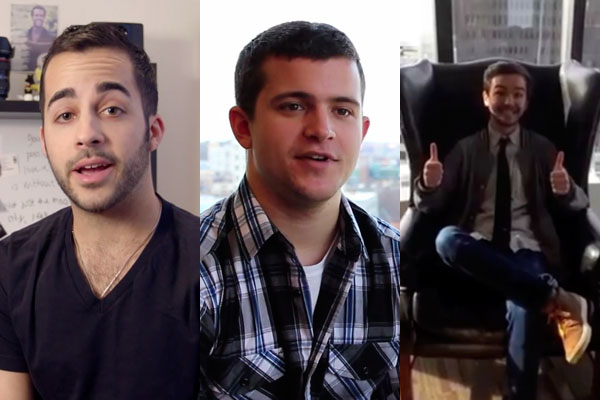Animals, advertising, and entrepreneurship—it’s co-op on camera

The winners of the 2014 Coolest Co-op Video contest exemplify the depth and breadth of Northeastern’s experiential learning program. One student helped develop brand strategy for an advertising agency in Boston, while another trained animals in Hawaii. A third student founded his own video production company and then interviewed a major player in the music industry.
Andy Nagashima, DMSB’15, and Alexander Rickert, S’15, tied for first place, while Colin Beatt, AMD’14, placed third. The annual contest, sponsored by the Office of Student Affairs, challenges undergraduates to make a short video explaining why their job was cooler than any other experiential learning opportunity in Northeastern co-op history. Each winner received a monetary prize.
Co-op is the cornerstone of Northeastern’s experiential learning model, which combines rigorous academic study with students gaining up to 18 months of real-world work experience prior to graduation.
This year’s coolest co-op entries were judged by a committee comprising representatives from the Office of Student Affairs, the Office of External Affairs, and the Office of Enrollment Management and Advancement.
Nagashima, a business major, worked for the Boston branch of the advertising agency Hill Holiday. As the company’s first Northeastern co-op, he helped develop a marketing strategy for Cadillac and other brands. He recorded his video with Vine, a mobile application that enables users to create short looping clips.
Nagashima said up until his second year of college, he never considered himself a brand-oriented person. But after learning about design thinking in a class for his entrepreneurship concentration, he saw someone can create something new based on design thinking and applied this knowledge on co-op.
“On co-op I was pleased to notice I was able to fully apply what I learned in class to help Cadillac understand its customers on a cerebral level,” said Nagashima, whose co-op experience included co-leading a cultural study to identify branding opportunities and presenting brand strategies that he personally developed.
He said the co-op experience opened his eyes to new opportunities to “discover, create, and inspire.”
Rickert, a biology major, traveled all the way to Hawaii for his co-op at Sea Life Park on the island of Oahu. He worked as an animal training intern at the educational and entertainment facility, learning how to communicate with dolphins and gaining insight into the marine animal training industry. In particular, Rickert worked with the very rare wholphin, a hybrid mammal whose mother is a bottlenose dolphin and father is a false killer whale.
Rickert said his passion for marine mammal training began at a young age after he watched the 1993 film Free Willy. In his video he also recalled building a model of an Orca tank as his third-grade science project and how he described himself as a “future Orca trainer” in his sixth-grade yearbook.
He said his co-op experiences Northeastern played a major role in helping him refocus his career direction. After completing a previous co-op at a pharmaceutical company, he decided to switch gears and pursue a co-op that aligned with this passion for marine mammal training.
Beatt, a graphic design major, took a unique approach to his final co-op at Northeastern. Instead of applying for video production co-ops that already existed, he decided to start his own company.
Over six months, Beatt worked on about 55 projects, including a short film and an interview with disc jockey Clinton Sparks, who has worked with Ludacris, Lady Gaga, and other well-known recording artists.
“On top of experimenting with certain videos and new ways of editing and watching tutorials online, I had to learn the whole other side of running a business and being part of the entire creative process of the video,” Beatt explained.
In the process, he learned the importance of maximizing his time. “I made sure I was always doing something that would contribute to my skills and work,” Beatt said. “I plan on continuing to do this. I know I can get work, I know I will enjoy it, and I know I can support myself.”





